Du Fu-the Saint of Poetry
Du Fu (February 12, 712 ~ 770), with Zi Mei as the name, was a great realist poet of the Tang Dynasty. Together with Li Bai, he was called "Li Du". Born in Gongxian County, Henan Province, he comes from Xiangyang, Hubei Province. In order to distinguish from the other two poets Li Shangyin and Du Mu, namely "Xiao Li Du", Du Fu and Li Bai are also called "Da Li Du", and Du Fu is often called "Lao Du".

In his youth, Du Fu visited Wuyue and Qizhao successively, during which he went to Luoyang to apply for the examination. After the age of 35, he first took the exam in Chang'an and failed; Later, he offered gifts to the emperor and noble people. Failure in officialdom witnessed the extravagance and social crisis of the upper class of the Tang Dynasty. In the 14th year of Tianbao (755), the rebellion between an and Shi broke out, Tongguan was lost, and Du Fu traveled to many places successively. In the second year of Qianyuan Dynasty (759), Du Fu abandoned his official position and entered Sichuan. Although he avoided the war and lived a relatively stable life, he still cared about ordinary people and state affairs. Du Fu created famous works such as climbing high, spring outlook, Northern Expedition, three officials and three departures. Although Du Fu is a realistic poet, he also has a wild and uninhibited side. It is not difficult to see Du Fu's heroic spirit from his famous work the song of the Eight Immortals in drinking.
The core of Du Fu's thought is the thought of benevolent government. He has the grand ambition of "to the king Yao and Shun, and then make the customs pure". Although Du Fu was not famous in his lifetime, he became famous and had a far-reaching impact on Chinese literature and Japanese literature. A total of about 1500 poems of Du Fu have been preserved, most of which are collected in the collection of Du Gongbu.
In the winter of the fifth year of Dali (770), he died of illness at the age of 59. Du Fu's influence in Chinese classical poetry is very far-reaching. He is called "the saint of poetry" by later generations, and his poetry is called "the history of poetry". Later generations called him Du Shiyi, Du Ministry of industry, Du Shaoling and Du thatched cottage.